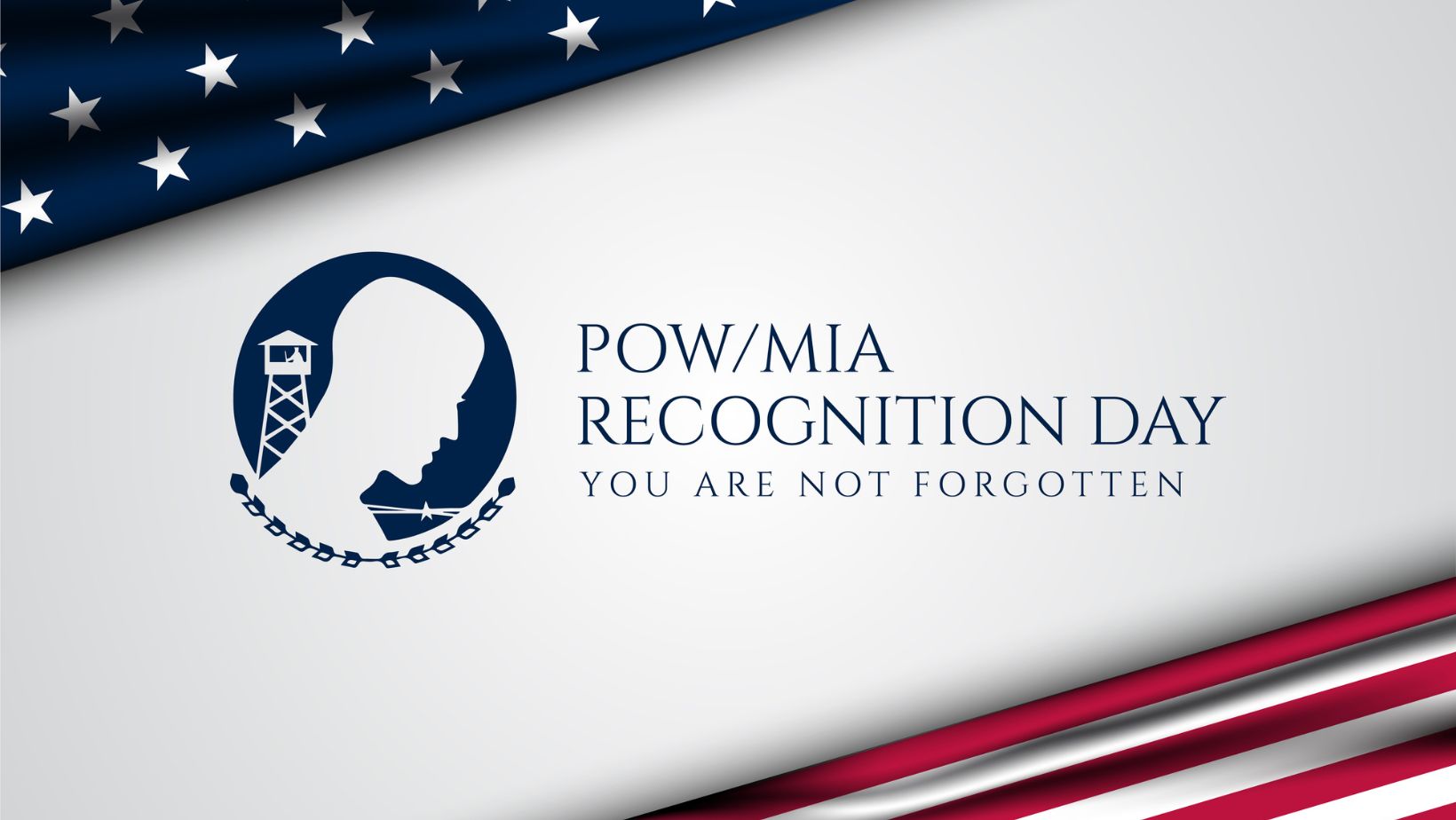Have you ever seen a black and white flag with the silhouette of a man’s head and the words “You Are Not Forgotten” flying at a government building? Or wondered about the empty table often set at military functions?
These powerful symbols represent a solemn promise to remember those who sacrificed their freedom, and sometimes their lives, in service to their country. But why do we dedicate a specific day to this remembrance, and how can we ensure that these heroes are truly never forgotten?
History of National POW/MIA Recognition Day
National POW/MIA Recognition Day is observed annually on the third Friday of September. This day of remembrance was established by an act of Congress in 1979 and is one of six days throughout the year that Congress has mandated the flying of the National League of Families’ POW/MIA flag.
The origins of this day can be traced back to the Vietnam War era when the issue of prisoners of war (POWs) and those missing in action (MIA) became a matter of significant public concern. Families of those missing or captured in Southeast Asia pushed for greater accountability and action from the U.S. government to recover or account for their loved ones.
The first national day of recognition for POW/MIAs was proclaimed by President Jimmy Carter in 1979. Since then, each subsequent president has issued an annual proclamation commemorating this day.
While initially focused on Vietnam War veterans, the day has evolved to honor all American prisoners of war and those missing in action from all conflicts. This day serves as a powerful reminder of the nation’s commitment to fully account for those who have not returned from active duty.
Ideas to Observe National POW/MIA Recognition Day
Observing National POW/MIA Recognition Day is about honoring the sacrifices of POW/MIAs and their families, and recommitting to the promise of bringing every American home. Here are some meaningful ways to participate:
- Attend local POW/MIA Recognition Day ceremonies or events
- Display the POW/MIA flag at your home or business
- Educate yourself and others about the history of American POWs and MIAs
- Support organizations dedicated to POW/MIA recovery and family support
- Participate in or organize a remembrance run/walk in your community
The Ongoing Mission: Full Accountability
National POW/MIA Recognition Day highlights the ongoing mission to achieve full accountability for all U.S. military personnel who have been prisoners of war or listed as missing in action.
This mission, spearheaded by the Defense POW/MIA Accounting Agency (DPAA), is a testament to the nation’s commitment to its service members. The work of accounting for America’s missing personnel is complex and challenging. It involves painstaking historical research, global field investigations, and cutting-edge forensic analysis.
Teams of experts work tirelessly to excavate crash and burial sites, interview witnesses, and use advanced DNA testing to identify remains. This process can take years or even decades, but it’s driven by the unwavering belief that every service member deserves to come home.
The significance of this mission extends beyond just accounting for the missing. It provides closure for families who have lived with uncertainty for years, sometimes generations. It honors the sacrifice of those who gave everything for their country.
And it sends a powerful message to current and future service members that their nation will never forget them, no matter how long it takes.
The Impact on Families and Communities
National POW/MIA Recognition Day also serves to highlight the profound impact that having a loved one classified as a prisoner of war or missing in action has on families and communities. The uncertainty and emotional toll experienced by these families is immeasurable.
Many have waited decades for news about their loved ones, living in a state of limbo between hope and grief. This day provides an opportunity for these families to come together, share their experiences, and find support in their shared struggle. It also allows communities to rally around these families, offering support and understanding.
The day serves as a reminder that the effects of war extend far beyond the battlefield and continue long after conflicts end. Many communities have established local memorials or hold annual events to honor their POW/MIAs, creating spaces for collective remembrance and healing. These local efforts, combined with national recognition, help ensure that the stories of POW/MIAs are not lost to time.
As we observe National POW/MIA Recognition Day, we’re reminded of the enduring cost of freedom and the profound sacrifices made by service members and their families. It’s a day that calls on all Americans to reflect on the true meaning of “no man left behind” and to recommit to the solemn promise to bring every American home.
Whether through supporting recovery efforts, honoring the memories of the missing, or simply taking a moment to reflect on their sacrifices, each of us has a role to play in ensuring that these heroes are truly never forgotten. In doing so, we not only honor the past but also strengthen the bonds of national unity and reaffirm the values that make our nation strong.
